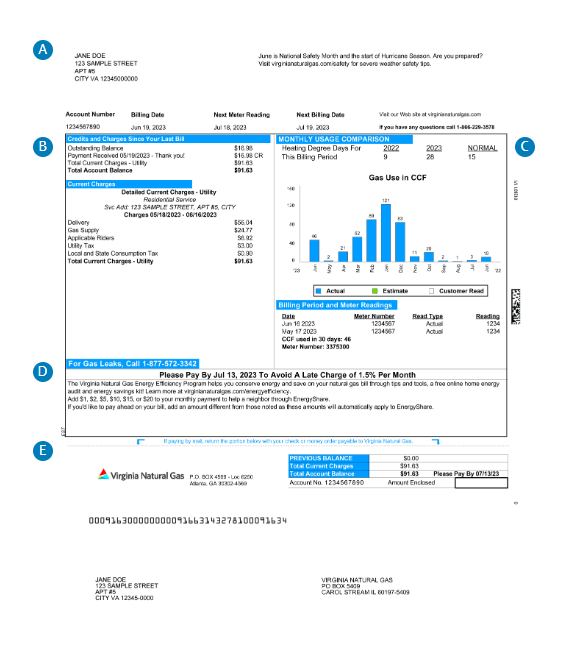Common Causes of High Bills
Managing Your Winter Heating Bills
Every customer deserves natural gas they can depend on at a cost they can afford.
While natural gas remains the best value for your heating needs, costs typically increase in the winter because your heating system works harder and runs more often to keep you comfortable. To help manage your winter heating bills, consider weatherizing your home and following these additional energy-saving tips.
Your Monthly Natural Gas Bill: Understand Your Charges
Why Your Bill May Vary
Your gas bill will vary from month-to-month for a variety of reasons. Here are some common factors that cause your bill amount to change:
Factors you can't control:
- Changes in weather caused your heat to come on more often.
- The cost of gas changes from month to month.
- The number of days in your billing cycle changed slightly.
Factors you can control:
- Your lifestyle changed, such as working at home.
- You added new gas appliances, like a hot tub or a gas fireplace.
- Your appliance usage increased – most common during holidays, school vacations, when you entertain or have houseguests.
Ways you can help control your gas usage:
- Take our free online home energy audit.
- Replace older, less energy-efficient gas appliances.
- Fix leaky hot water faucets.
- Replace furnace and air conditioning filters.
- Relocate thermostats away from drafty or chilly areas.
- Clean dryer lint traps.
- Repair windows that don't close properly. Replace single-pane windows.
- Close fireplace dampers when not in use.
For additional tips and tools to help control your energy usage, check out our Energy Efficiency Program.
To help lessen fluctuations in your bill year-round, consider enrolling in the Budget Plan program.

Your Monthly Natural Gas Bill: Understand Your Charges
Current natural gas costs across the United States reflect continued uncertainties and speculation over what the next 12 months hold globally for weather patterns, market conditions and escalating geopolitical events that continue to cause an uptick in the current and forward market for natural gas prices.
Learn MoreGeneral Residential Charges
Service Charges: Every residential customer incurs a service charge for initiating service.
Seasonal Connection/Leave It On: If service is disconnected and resumed within nine months, a seasonal connection and/or reconnection fee of $40 is charged.
Furnace Light-Up Service: Virginia Natural Gas professionals can relight your manual pilot light if you have turned off your furnace and are unable to relight. Furnace Light-Up Fee Schedule:
- Service completed on or before September 15 -- no fee.
- Service completed between September 16-October 15 -- Residential: $20. Non-Residential: $20 per appliance.
- Service completed between October 16-March 31 -- Residential: $30. Non-Residential: $40 per appliance.
NOTE: The charge is only for lighting the furnace. Additional charges may apply to inspect, adjust and light certain appliances. Commercial customers: Please note that a charge applies for each furnace.
Deposits: An initial deposit may be required. If a deposit is required, it will be retained until the account reflects prompt payment for one year or until service is disconnected and a final bill is rendered. After one year, your account will be reviewed and the deposit and earned interest will be applied to your account if a satisfactory payment record has been established. If disconnection of your gas service occurs, the deposit, plus any earned interest, will be applied to all unpaid balances and a bill/refund will be rendered for the difference. Simple interest is earned on all deposits held over 90 days at an annual rate set for all utilities by the State Corporation Commission. For the current interest rate, consult the Customer Care Center.
Credit Checks: First time customers are asked for permission to have a credit check performed through a credit reporting agency. This helps us to determine how much if any deposit is required.
Late Payment Charge: Virginia Natural Gas bills are sent on a monthly basis and are due and payable upon presentation. Any balance that remains unpaid after the due date, as stated on your bill, is subject to a late payment charge, excluding local utility taxes.
Returned Check: There is a handling fee for each check that we receive that is returned by your bank.
Reconnection Charge: If service is interrupted for nonpayment, a service reconnection fee is charged to cover the cost of restoring your service. A deposit may be required.
How is your bill calculated?
Natural Gas Cost (30-40% of your annual bill)
Natural gas costs make up the largest portion of your Virginia Natural Gas bill. This is the charge for the gas you use during the billing month. It is calculated by multiplying your gas usage by the average cost per therm we pay for gas supplies. The amount you pay varies monthly based on the cost of gas and the amount you use. Virginia Natural Gas does not profit from gas costs; we pass our cost on to you without markup.
Delivery charges (50-60% of your annual bill)
Delivery charges, which cover costs to deliver safe and reliable natural gas to your home, are included in your natural gas costs.
Taxes (6-11% of your annual bill)
The utility taxes on your bill, include local, sales and state taxes. Virginia Natural Gas does not profit from this charge.
Weather Normalization Adjustment (WNA)
The WNA applies to six bills during the winter heating season, typically November through April. Each bill period during this time will have a different WNA factor based on the weather experienced during that billing period. Weather conditions colder than normal will result in a bill credit. Weather conditions warmer than normal will result in a surcharge. Learn how WNA is calculated.



